Sir John Monash, Personal Files Book 14, 6 October - 30 November 1916, Part 6
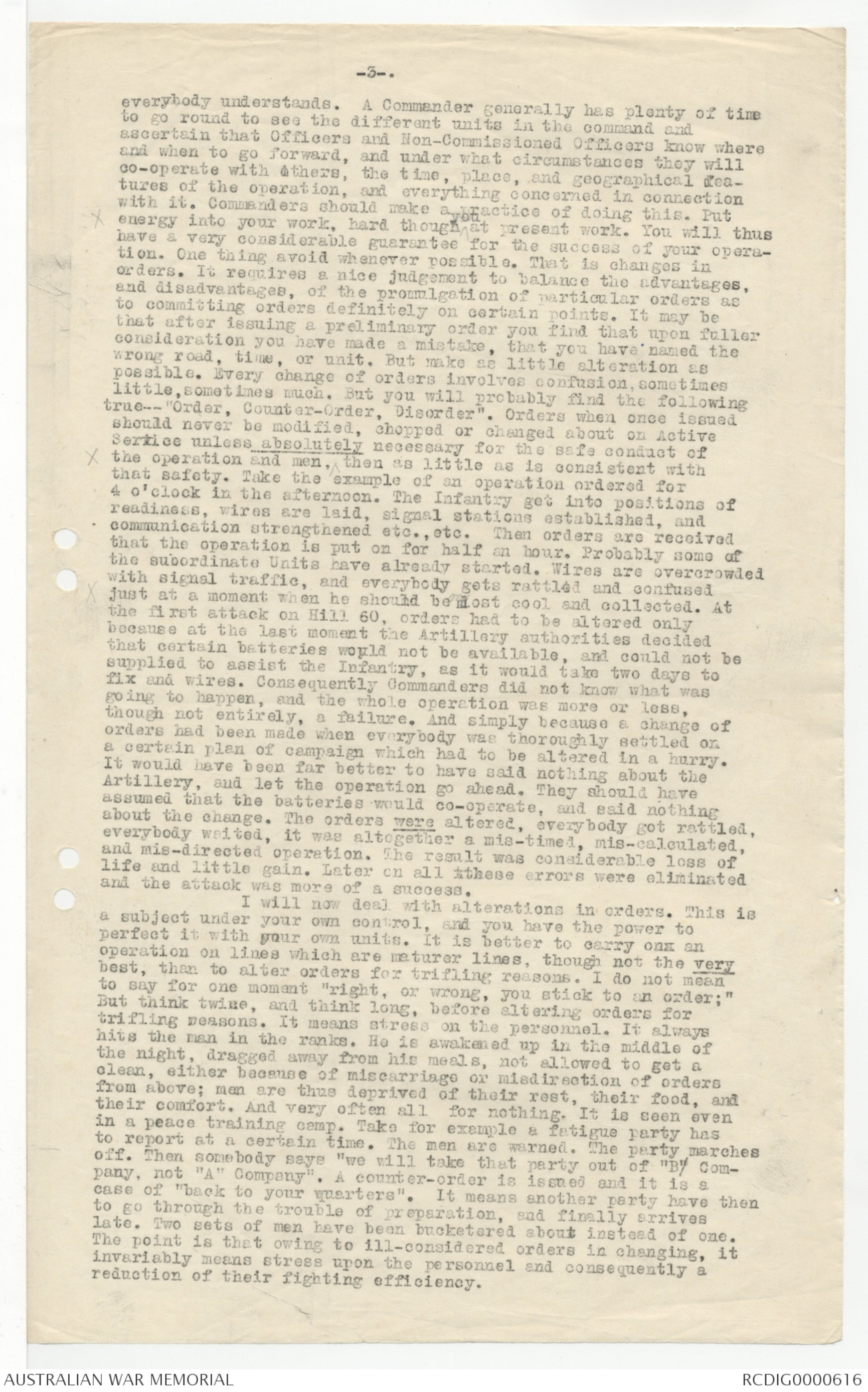
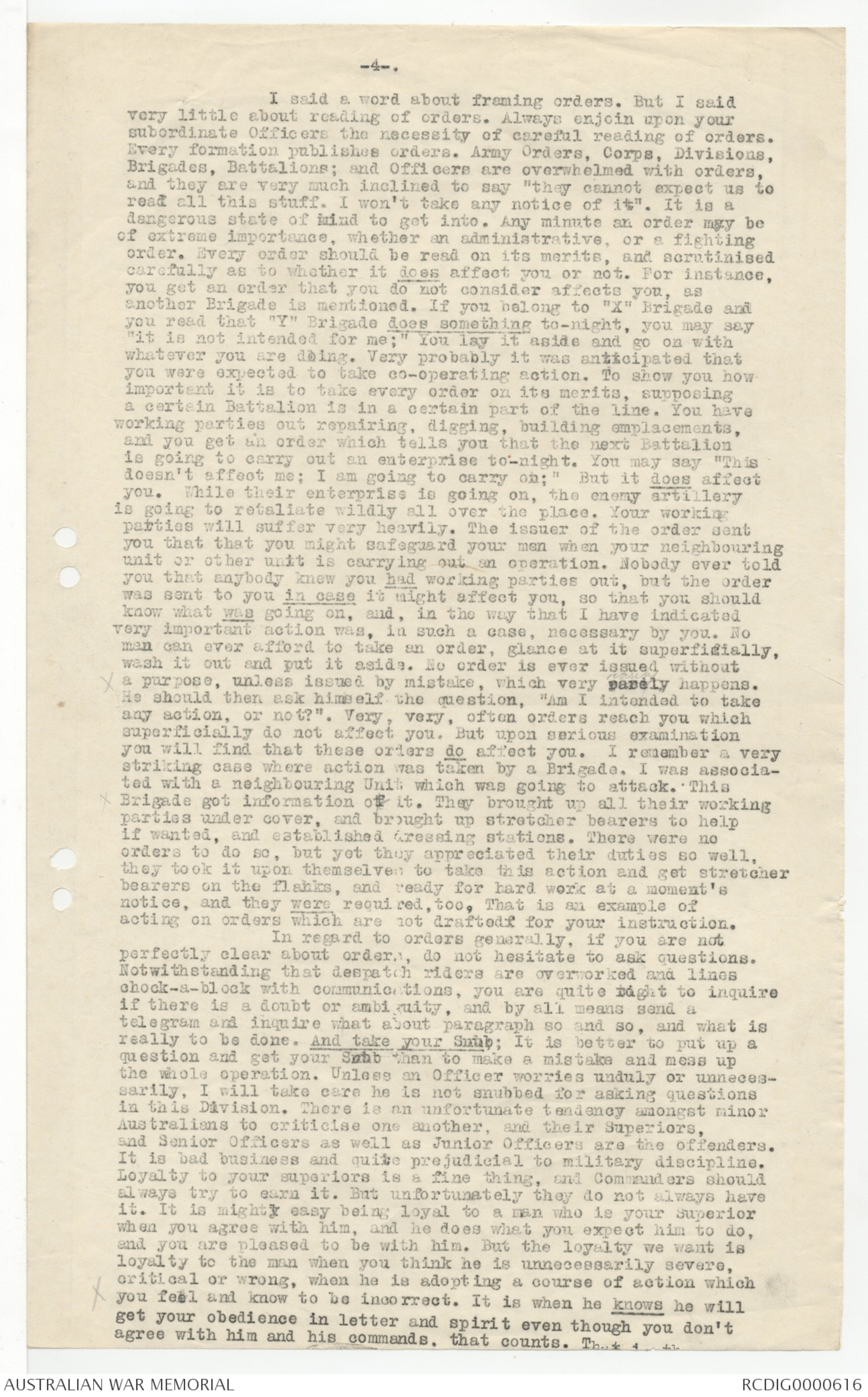
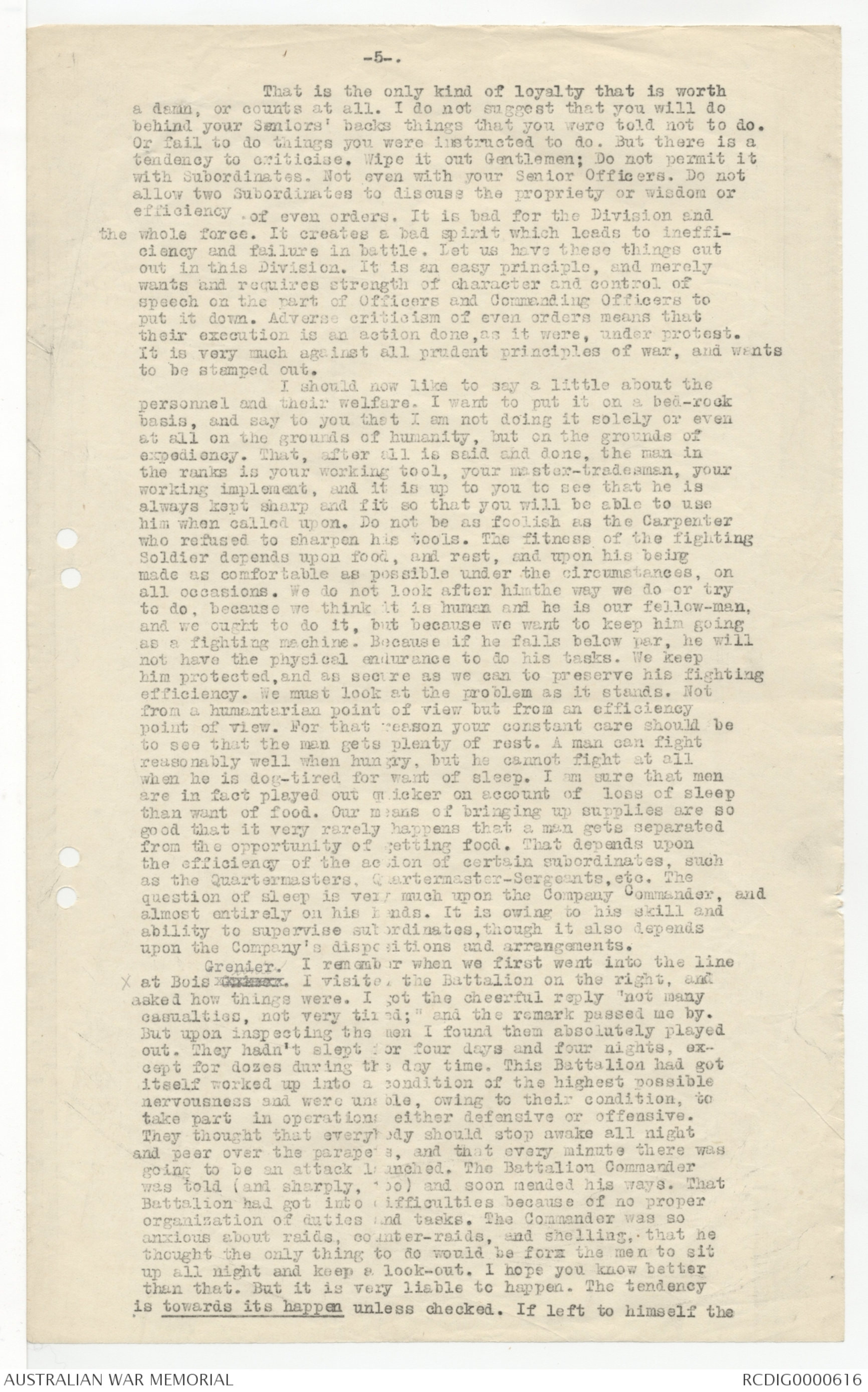
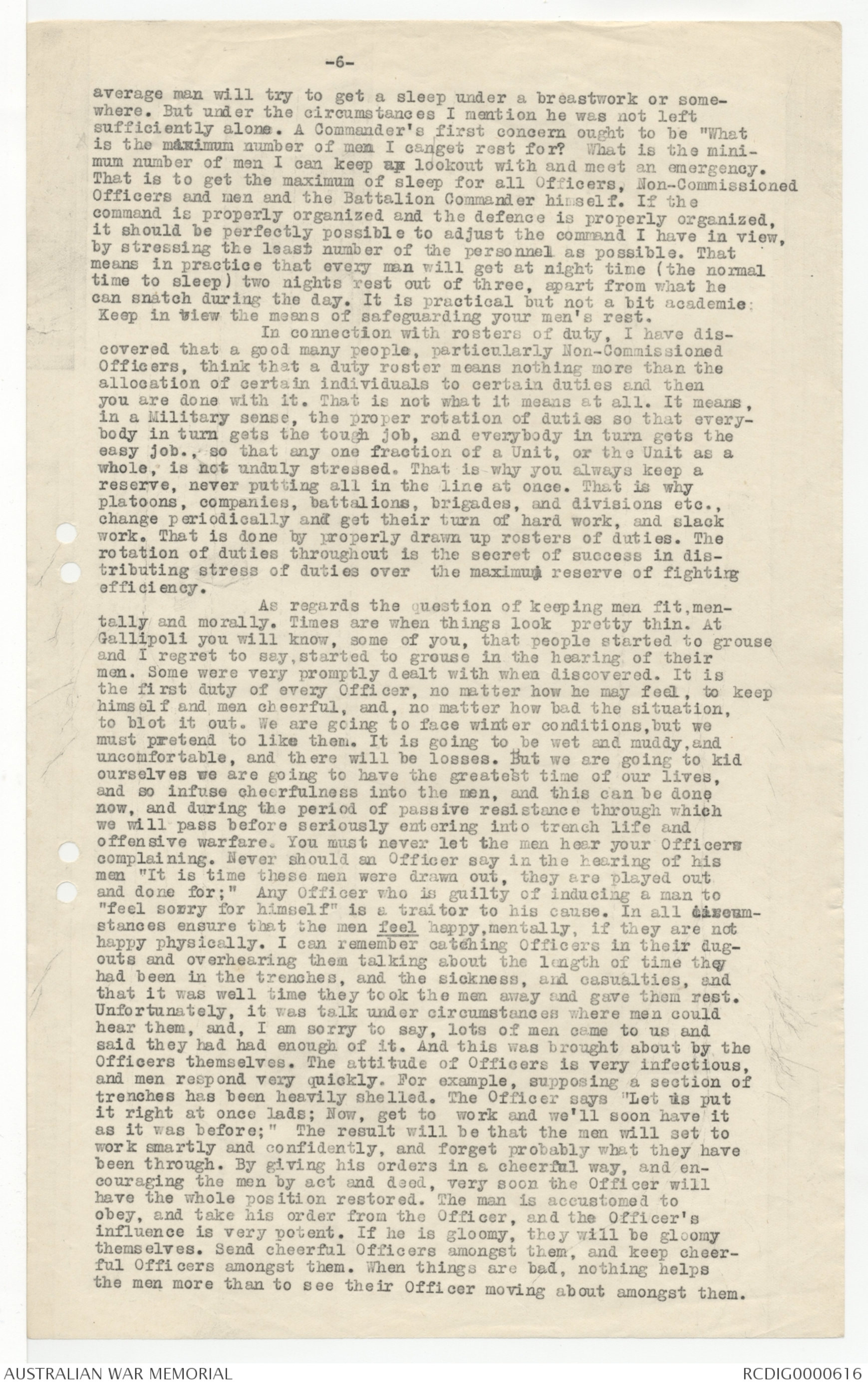
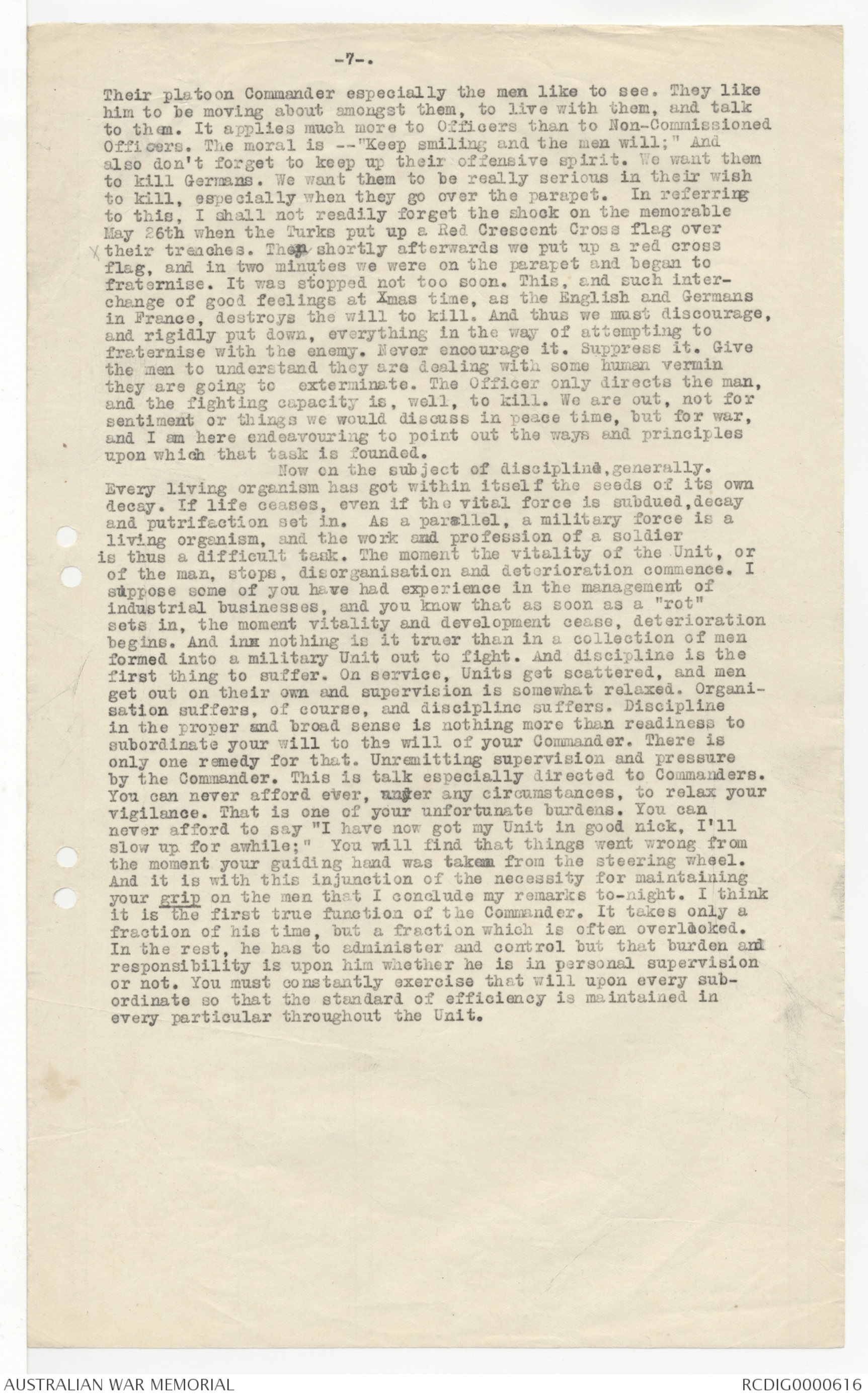
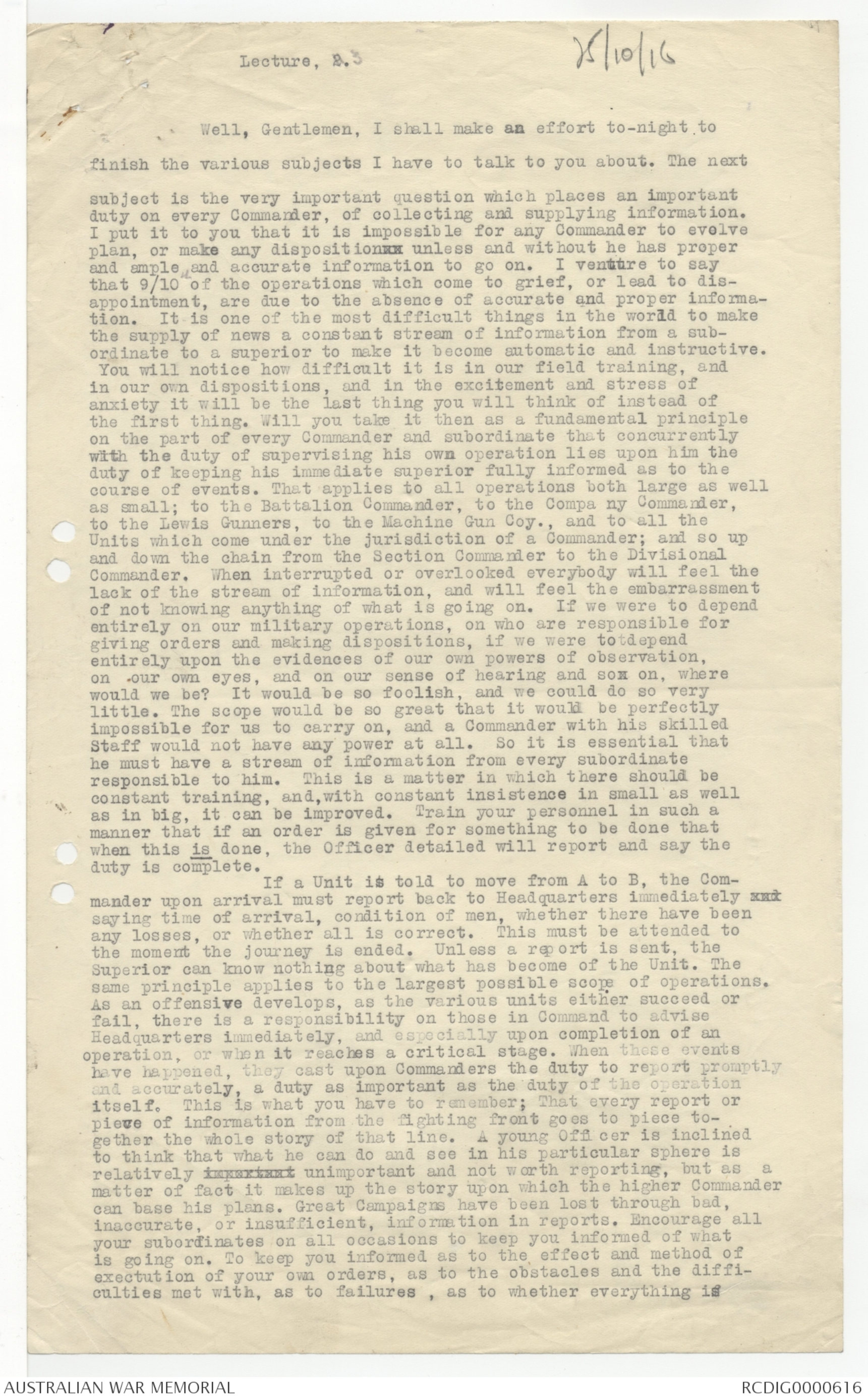
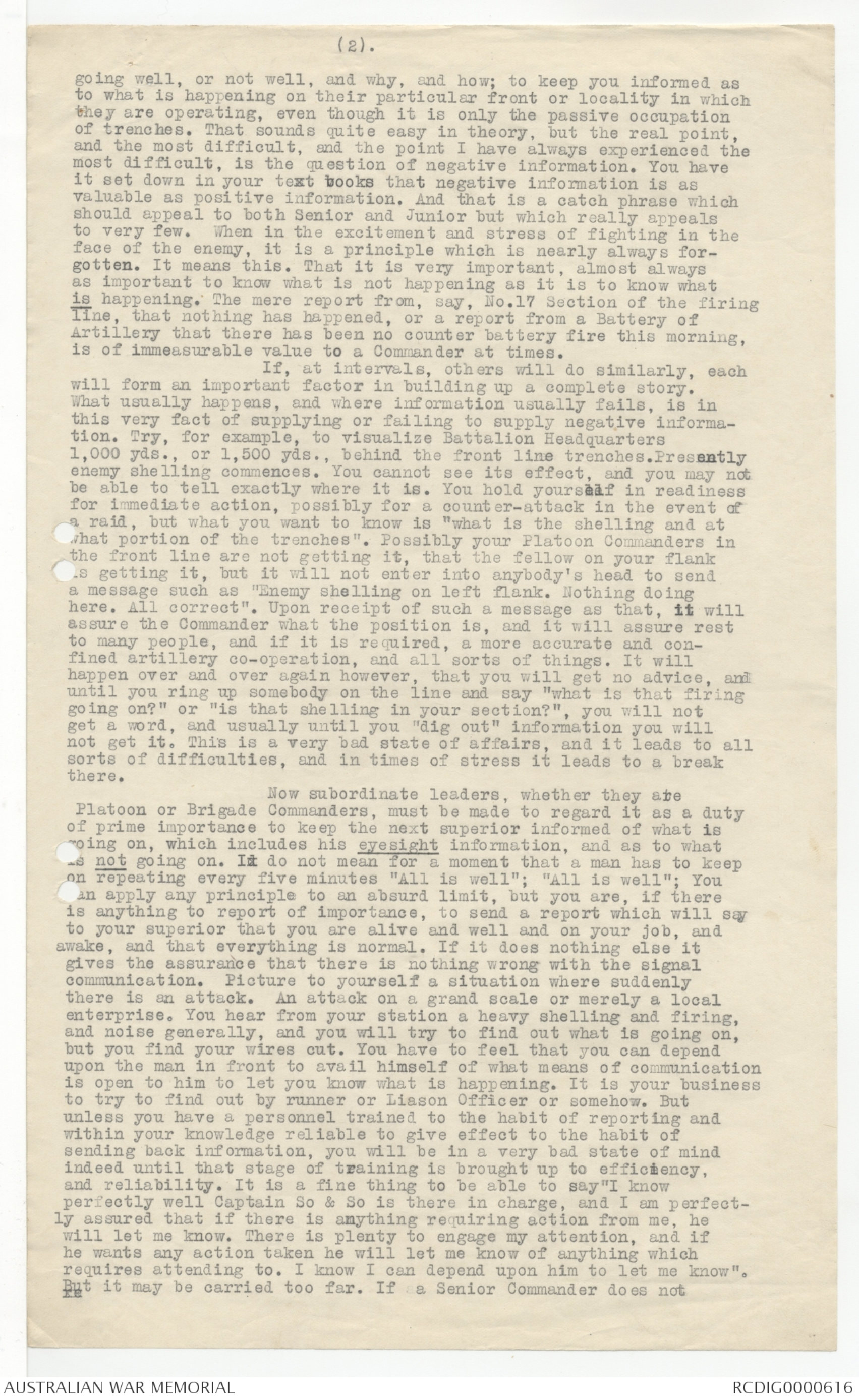
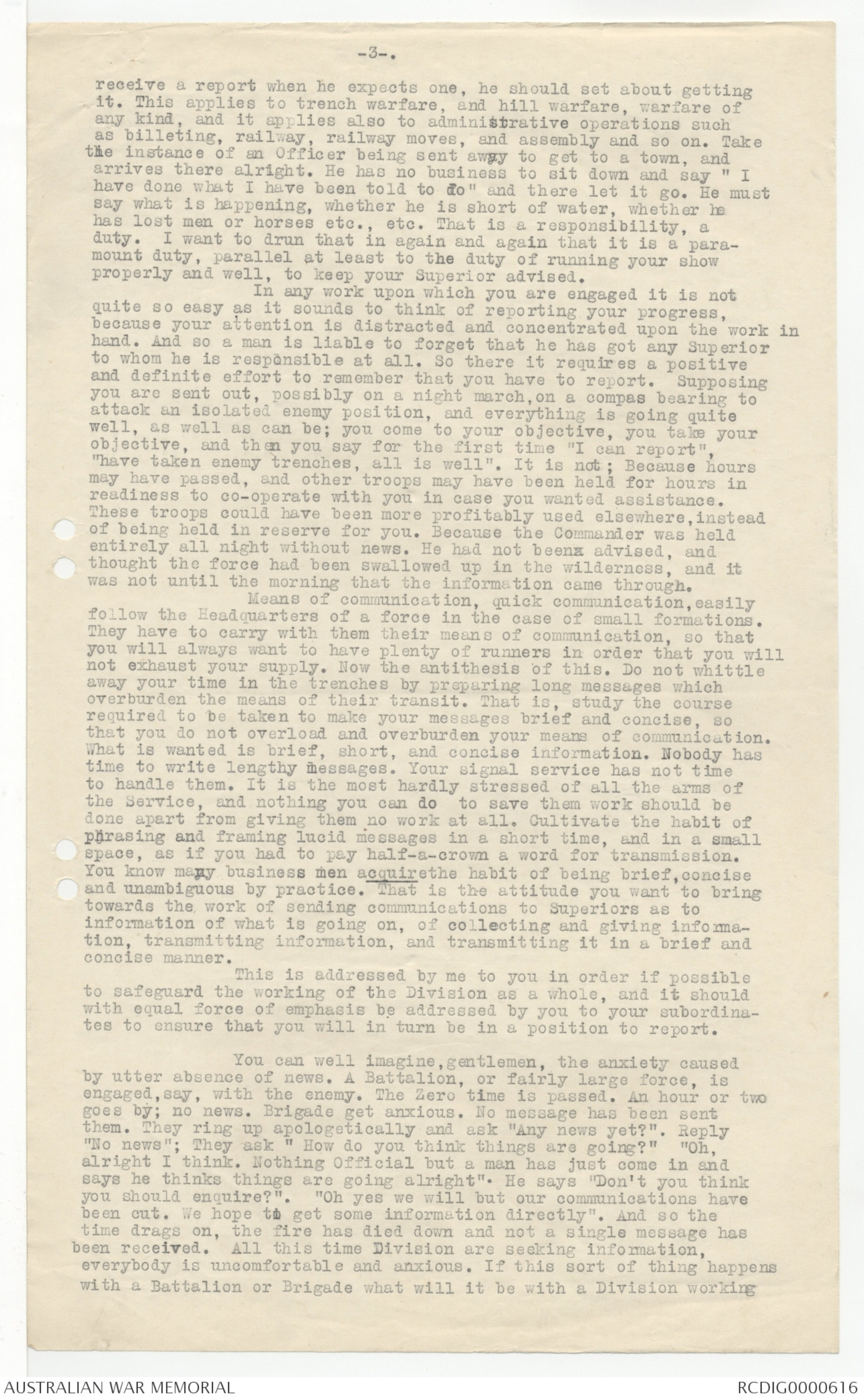
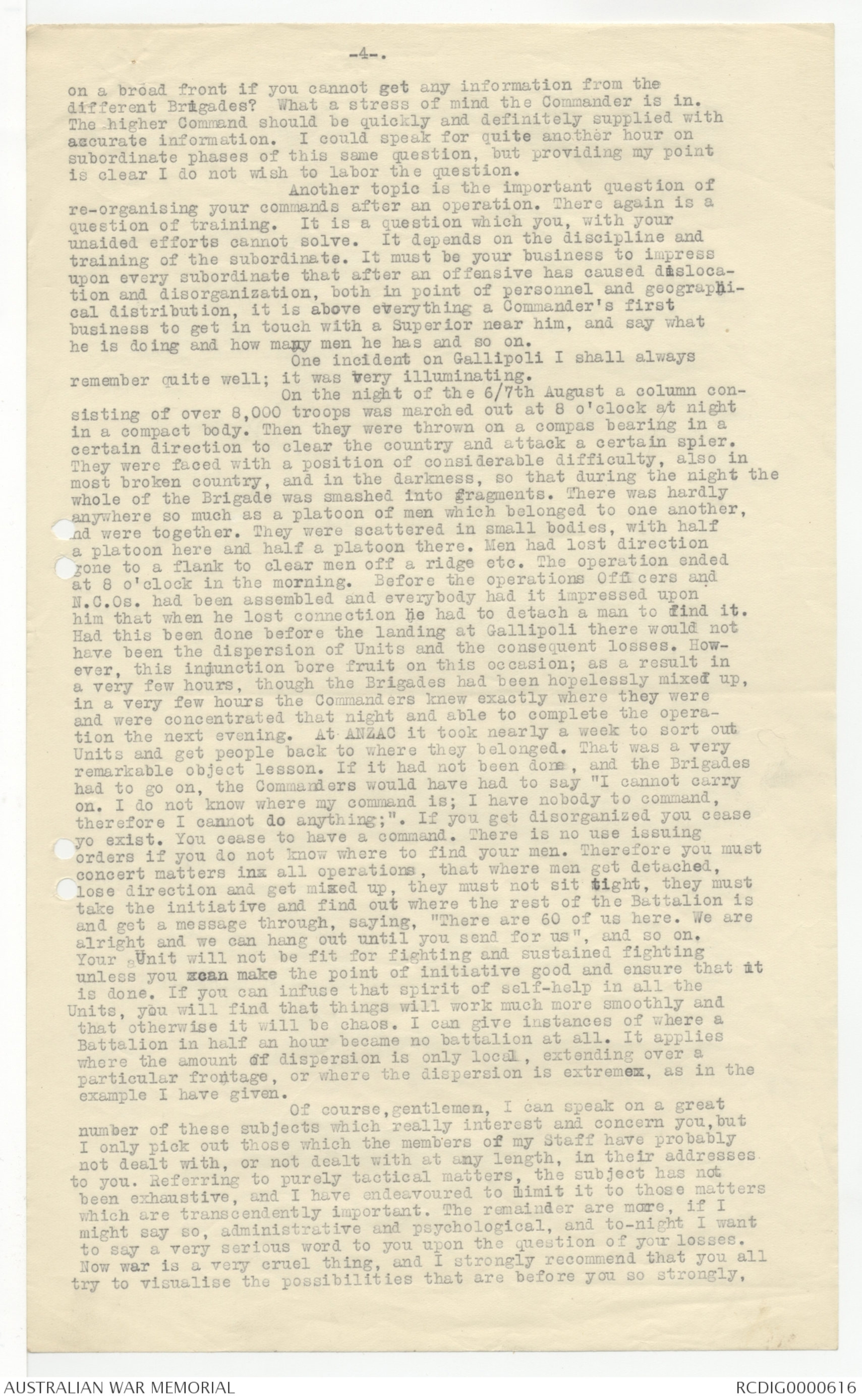
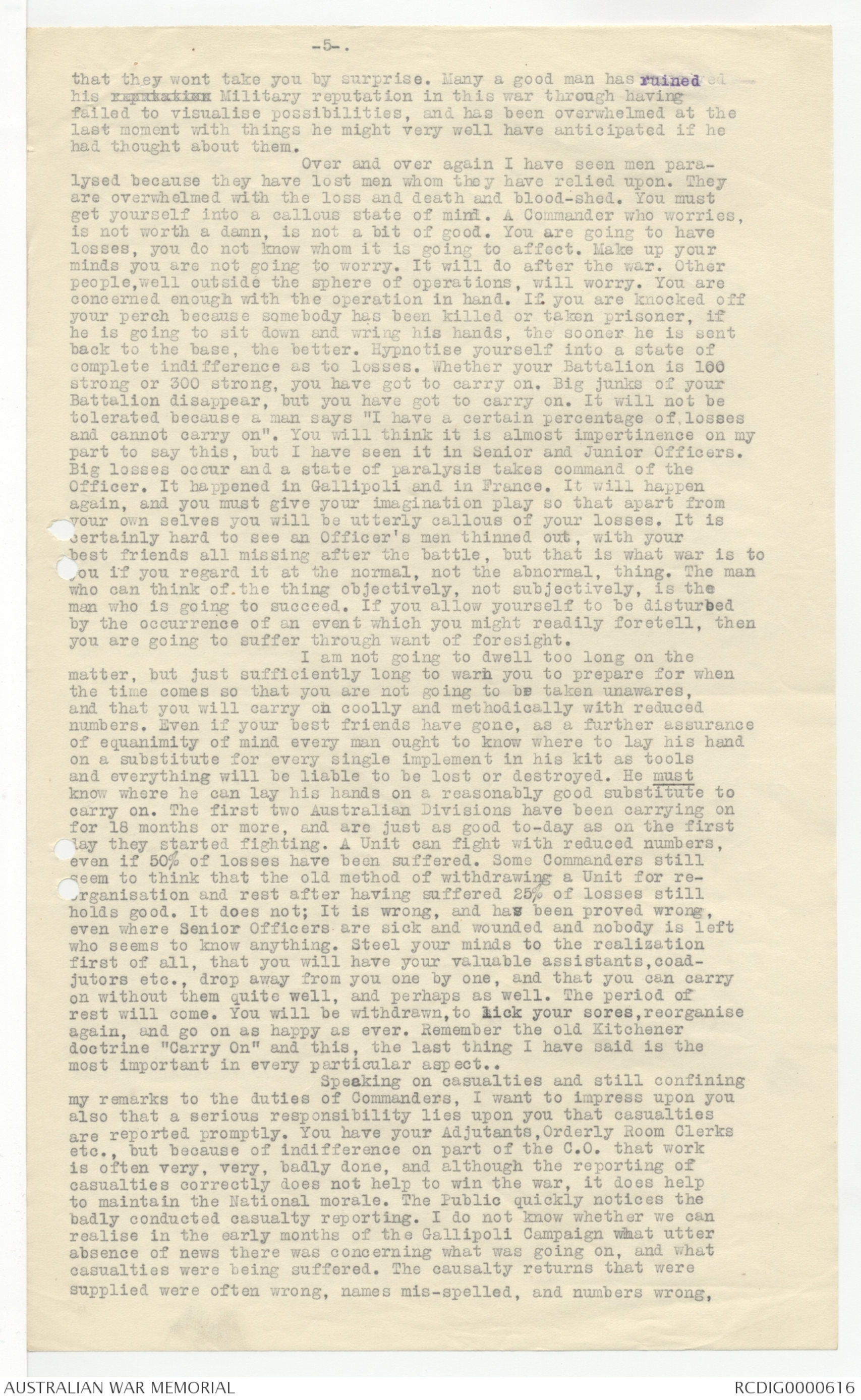
– 3 –.
everybody understands. A Commander generally has plenty of time
to go round to see the different units in the command and
ascertain that Officers and Non-Commissioned Officers know where
and when to go forward, and under what circumstances they will
co-operate with others, the time, place, and geographical features
of the operation, and everything concerned in connection
with it. Commanders should make a practice of doing this. Put
energy into your work, hard though ^you at present work. You will thus
have a very considerable guarantee for the success of your operation.
One thing avoid whenever possible. That is changes in
orders. It requires a nice judgement to balance the advantages,
and disadvantages, of the promulgation of particular orders as
to committing orders definitely on certain points. It may be
that after issuing a preliminary order you find that upon fuller
consideration you have made a mistake, that you have named the
wrong road, time, or unit. But make as little alteration as
possible. Every change of orders involves confusion, sometimes
little, sometimes much. But you will probably find the following
true--"Order, Counter-Order, Disorder". Orders when once issued
should never by modified, chopped or changed about on Active
Service unless absolutely necessary for the safe conduct of
the operation and men, then as little as is consistent with
that safety. Take the example of an operation ordered for
4 o'clock in the afternoon. The Infantry get into positions of
readiness, wires are laid, signal stations established, and
communication strengthened etc., etc. Then orders are received
that the operation is put on for half an hour. Probably some of
the subordinate Units have already started. Wires are overcrowded
with signal traffic, and everybody gets rattled and confused
just at a moment when he should be most cool and collected. At
the first attack on Hill 60, orders had to be altered only
because at the last moment the Artillery authorities decided
that certain batteries would not be available, and could not be
supplied to assist the Infantry, as it would take two days to
fix and wires. Consequently Commanders did not know what was
going to happen, and the whole operation was more or less,
though not entirely, a failure. And simply because a change of
orders had been made when everybody was thoroughly settled on
a certain plan of campaign which had to be altered in a hurry.
It would have been far better to have said nothing about the
Artillery, and let the operation go ahead. They should have
assumed that the batteries would co-operate, and said nothing
about the change. The orders were altered, everybody got rattled,
everybody waited, it was altogether a mis-timed, mis-calculated,
and mis-directed operation. The result was considerable loss of
life and little gain. Later on all xthese errors were eliminated
and the attack was more of a success.
I will now deal with alterations in orders. This is
a subject under your own control, and you have the power to
perfect it with your own units. It is better to carry one an
operation on lines which are maturer lines, though not the very
best, than to alter orders for trifling reasons. I do not mean
to say for one moment "right, or wrong, you stick to an order;"
But think twice, and think long, before altering orders for
trifling reasons. It means stress on the personnel. It always
hits the man in the ranks. He is awakened up in the middle of
the night, dragged away from his meals, not allowed to get a
clean, either because of miscarriage or misdirection of orders
from above; men are thus deprived of their rest, their food, and
their comfort. And very often all for nothing. It is seen even
in a peace training camp. Take for example a fatigue party has
to report at a certain time. The men are warned. The party marches
off. The somebody says "we we will take that party out of "B" Company,
not "A" Company". A counter-order is issued and it is a
case of "back to your quarters". It means another party have then
to go through the trouble of preparation, and finally arrives
late. Two sets of men have been bucketered about instead of one.
The point is that owing to ill-considered orders in changing, it
invariably means stress upon the personnel and consequently a
reduction of their fighting efficiency.
– 4 –.
I said a word about framing orders. But I said
very little about reading of orders. Always enjoin upon your
subordinate Officers the necessity of careful reading of orders.
Every formation publishes orders. Army Orders, Corps, Divisions,
Brigades, Battalions; and Officers are overwhelmed with orders,
and they are very much inclined to say "they cannot expect us to
read all this stuff. I won't take any notice of it". It is a
dangerous state of mind to get into. Any minute an order may be
of extreme importance, whether an administrative, or a fighting
order. Every order should be read on its merits, and scrutinised
carefully as to whether it does affect you or not. For instance,
you get an order that you do not consider affects you, as
another Brigade is mentioned. If you belong to "X" Brigade and
you read that "Y" Brigade does something to-night, you may say
'it is not intended for me;" You lay it aside and go on with
whatever you are doing. Very probably it was anticipated that
you were expected to take co-operating action. To show you how
important it is to take every order on its merits, supposing
a certain Battalion is in a certain part of the line. You have
working parties out repairing, digging, building emplacements,
and you get an order which tells you that the next Battalion
is going to carry out an enterprise to-night. You may say "This
doesn't affect me; I am going to carry on;" But it does affect
you. While their enterprise is going on, the enemy artillery
is going to retaliate wildly all over the place. Your working
parties will suffer very heavily. The issuer of the order sent
you that that you might safeguard your men when your neighbouring
unit or other unit is carrying out an operation. Nobody ever told
you that anybody knew you had working parties out, but the order
was sent to you in case it might affect you, so that you should
know what was going on, and, in the way that I have indicated
very important action was, in such a case, necessary by you. No
man can ever afford to take an order, glance at it superficially,
wash it out and put it aside. No order is ever issued without
a purpose, unless issued by mistake, which very rarely parely happens.
He should then ask himself the question, "Am I intended to take
any action, or not?" Very, very often orders reach you which
superficially do not affect you, But upon serious examination
you will find that these orders do affect you. I remember a very
striking case where action was taken up by a Brigade. I was associated
with a neighbouring Unit which was going to attack. This
Brigade got information of it. They brought up all their working
parties under cover, and brought up stretcher bearers to help
if wanted, and established dressing stations. There were no
orders to do so, but yet they appreciated their duties so well,
they took it upon themselves to take this action and get stretcher
bearers on the flanks, and ready for hard work at a moment's
notice, and they were required, too. That is an example of
acting on orders which are not draftedf for your instruction.
In regard to orders generally, if you are not
perfectly clear about order, do not hesitate to ask questions.
Notwithstanding that despatch riders are overworked and lines
chock-a-block with communications, you are quite right to inquire
if there is any doubt or ambiguity, and by all means send a
telegram and inquire what about paragraph so and so, and what is
really to be done. And take your Snub: It is better to put up a
question and get your Snub than to make a mistake and mess up
the whole operation. Unless an Officer worries unduly or unnecessarily,
I will take care he is not snubbed for asking questions
in this Division. There is an unfortunate tendency amongst minor
Australians to criticise one another, and their Superiors,
and Senior Officers as well as Junior Officers are the offenders.
It is bad business and quite prejudicial to military discipline.
Loyalty to your superiors is a fine thing, and Commanders should
always try to earn it. But unfortunately they do not always have
it. It is mighty easy being loyal to a man who is your superior
when you agree with him, and he does what you expect him to do,
and you are pleased to be with him. But the loyalty we want is
loyalty to the man when you think he is unnecessarily severe,
critical or wrong, when he is adopting a course of action which
you feel and know to be incorrect. It is when he knows he will
get your obedience in letter and spirit even though you don't
agree with him and his commands, that counts. That
– 5 –.
That is the only kind of loyalty that is worth
a damn, or counts at all. I do not suggest that you will do
behind your Seniors' backs things that you were told not to do.
Or fail to do things you were instructed to do. But there is a
tendency to criticise. Wipe it out Gentlemen; Do not permit it
with subordinates. Not even with your Senior Officers. Do not
allow two Subordinates to dismiss the propriety or wisdom or
efficiency of even orders. It is bad for the Division and
the whole force. It creates a bad spirit which leads to inefficiency
and failure in battle. Let us have these things cut
out in this Division. It is an easy principle, and merely
wants and requires strength of character and control of
speech on the part of Officers and Commanding Officers to
put it down. Adverse criticism of even orders means that
their execution is an action done, as it were, under protest.
It is very much against all prudent principles of war, and wants
to be stamped out.
I should now like to say a little about the
personnel and their welfare. I want to put it on a bed-rock
basis, and say to you that I am not doing it solely or even
at all on the grounds of humanity, but on the grounds of
expediency. That, after all is said and done, the man in
the ranks in your working tool, your master-tradesman, your
working implement, and it is up to you to see that he is
always kept sharp and fit so that you will be able to use
him when called upon. Do not be as foolish as the Carpenter
who refused to sharpen his tools. The fitness of the fighting
soldier depends upon food, and rest, and upon his being
made as comfortable as possible under the circumstances, on
all occasions. We do not look after him the way we do or try
to do, because we think it is human and he is our fellow-man,
and we ought to do it, but because we want to keep him going
as a fighting machine. Because if he falls below par, he will
not have the physical endurance to do his tasks. We keep
him protected, and as secure as we can to preserve his fighting
efficiency. We must look at the problem as it stands. Not
from a humanitarian point of view but from an efficiency
point of view. For that reason your constant care should be
to see that the man gets plenty of rest. A man can fight
reasonably well when hungry, but he cannot fight at all
when he is dog-tired for want of sleep. I am sure that men
are in fact played out quicker on account of loss of sleep
than want of food. Our means of bringing up supplies are so
good that it very rarely happens that a man gets separated
from the opportunity of getting food. That depends upon
the efficiency of the section of certain subordinates, such
as the Quartermasters, Quartermaster-Sergeants, etc. The
question of sleep is very much upon the Company Commander, and
almost entirely on his hands. It is owing to his skill and
ability to supervise subordinates, though it also depends
upon the Company's dispositions and arrangements.
I remember when we first went into the line
at Bois xxxxxx Grenier. I visited the Battalion on the right, and
asked how things were. I got the cheerful reply 'not many
casualties, not very tired;" and the remark passed me by.
But upon inspecting the men I found them absolutely played
out. They hadn't slept for four days and four nights, except
for dozes during the day time. This Battalion had got
itself worked up into a condition of the highest possible
nervousness and were unable, owing to their condition, to
take part in operations either defensive or offensive.
They thought that everybody should stop awake all night
and peer over the parapets, and that every minute there was
going to be an attack launched. The Battalion Commander
was told (and sharply, too) and soon mended his ways. That
Battalion had got into difficulties because of no proper
organisation of duties and tasks. The Commander was so
anxious about raids, counter-raids, and shelling, that he
thought the only thing to do would be forx the men to sit
up all night and keep a look-out. I hope you know better
than that. But it is very liable to happen. The tendency
is towards its happen unless checked. If left to himself the
– 6 –
average men will try to get a sleep under a breastwork or somewhere.
But under the circumstances I mention he was not left
sufficiently alone. A Commander's first concern ought to be "What
is the maximum number of men I can get rest for? What is the minimum
number of men I can keep ax lookout with and meet an emergency.
That is to get the maximum of sleep for all Officers, Non-Commissioned
Officers and men and the Battalion Commander himself. If the
command is properly organized and the defence is properly organized,
it should be perfectly possible to adjust the command I have in view,
by stressing the least number of the personnel as possible. That
means in practice that every man will get at night time (the normal
time to sleep) two nights rest out of three, apart from what he
can snatch during the day. It is practical but not a bit academic
Keep in view the means of safeguarding your men's rest.
In connection with rosters of duty, I have discovered
that a good many people, particularly Non-Commissioned
Officers, think that a duty roster means nothing more than the
allocation of certain individuals to certain duties and then
you are done with it. This is not what it means at all. It means,
in a Military sense, the proper rotation of duties so that everybody
in turn gets the tough job, and everybody in turn gets the
easy job., so that any one fraction of a Unit, or this Unit as a
whole, is not unduly stressed. That is why you always keep a
reserve, never putting all in the line at once. That is why
platoons, companies, battalions, brigades, and divisions etc.,
change periodically and get their turn of hard work, and slack
work. That is done by properly drawn up rosters of duties. The
rotation of duties throughout is the secret of success in distributing
stress of duties over the maximum reserve of fighting
efficiency.
As regards the question of keeping men fit, mentally
and morally, Times are when things look pretty thin. At
Gallipoli you will know, some of you, that people started to grouse
and I regret to say, started to grouse in the hearing of their
men. Some were very promptly dealt with when discovered. It is
the first duty of every Officer, no matter how he may feel, to keep
himself and men cheerful, and, no matter how bad the situation,
to blot it out. We are going to face winter conditions, but we
must pretend to like them. It is going to be wet and muddy, and
uncomfortable, and there will be losses. But we are going to kid
ourselves we are going to have the greatest time of our lives,
and so infuse cheerfulness into the men, and this can be done
now, and during the period of passive resistance through which
we will pass before seriously entering into trench life and
offensive warfare. You must never let the men hear your Officers
complaining. Never should an Officer say in the hearing of his
men "It is time these men were drawn out, they are played out
and done for;" Any Officer who is guilty of inducing a man to
"feel sorry for himself" is a traitor to his cause. In all circumstances
ensure that the men feel happy,mentally, if they are not
happy physically. I can remember catching Officers in their dugouts
and overhearing them talking about the length of time they
had been in the trenches, and the sickness, and casualties, and
that it was well time they took the men away and gave them rest.
Unfortunately, it was talk under circumstances where men could
hear them, and, I am sorry to say, lots of men came to us and
said they had had enough of it. And this was brought about by the
Officers themselves. The attitude of Officers is very infectious,
and men respond very quickly. For example, supposing a section of
trenches has been heavily shelled. The Officer says "Let us put
it right at once lads; Now to get to work and we'll soon have it
as it was before;" The result will be that the men will set to
work smartly and confidently, and forget probably what they have
been though. By giving his orders in a cheerful way, and encouraging
the men by act and deed, very soon the Officer will
have the whole position restored. The man is accustomed to
obey, and take his order from the Officer, and the Officer's
influence is very potent. If he is gloomy, they will be gloomy
themselves. Send cheerful Officers amongst them, and keep cheerful
Officers amongst them. When things are bad, nothing helps
the men more than to see their Officers moving amonst them.
– 7 –
Their platoon Commander especially the men like to see. They like
him to be moving about amongst them, to live with them, and talk
to them. It applies much more to Officers than to Non-Commissioned
Officers. The moral is – – "Keep smiling and the men will;" And
also don't forget to keep up their offensive spirit. We want them
to kill Germans. We want them to be really serious in their wish
to kill, especially when they go over the parapet. In referring
to this, I shall not readily forget the shock on the memorable
May 26th when the Turks put up a Red Crescent Cross flag over
their trenches. Then shortly afterwards we put up a red cross
flag, and in two minutes we were on the parapet and began to
fraternise. It was stopped not too soon. This, and such interchange
of good feelings at Xmas time, as the English and Germans
in France, destroys the will to kill. And thus we must discourage,
and rigidly put down, everything in the way of attempting to
fraternise with the enemy. Never encourage it. Suppress it. Give
the men to understand they are dealing with some human vermin
they are going to exterminate. The Officer only directs the man,
and the fighting capacity is, well, to kill. We are out, not for
sentiment or things we would discuss in peace time, but for war,
and I am here endeavouring to point out the ways and principles
upon which that task is founded.
Now on the subject of discipline, generally.
Every living organism has got within itself the seeds of its own
decay. If life ceases, even if the vital force is subdued,decay
and putrification set it. As a parallel, a military force is a
living organism, and the work and profession of a soldier
is thus a difficult task. The moment the vitality of the Unit, or
of the man, stops, disorganisation and deterioration commence. I
suppose some of you had experience in the management of
industrial businesses, and you know that as soon as a "rot"
sets in, the moment vitality and development cease, deterioration
begins. And inx nothing is it truer than in a collection of men
formed into a military Unit out to fight. And discipline is the
first thing to suffer. On service, Units get scattered, and men
get out on their own and supervision is somewhat relaxed. Organisation
suffers, of course, and discipline suffers. Discipline
in the proper and broad sense is nothing more than readiness to
subordinate your will to the will of your Commander. There is
only one remedy for that. Unremitting supervision and pressure
by the Commander. This is talk especially directed to Commanders.
You can never afford ever, under any circumstances, to relax your
vigilance. That is one of your unfortunate burdens. You can
never afford to say "I have now got my Unit in good nick, I'll
slow up for awhile;" You will find that things went wrong from
the moment your guiding hand was taken from the steering wheel.
And it is with this injunction of the necessity for maintaining
your grip on the men that I conclude my remarks to-night. I think
it is the first true function of the Commander. It takes only a
fraction of his time, but a fraction which is often overlooked.
In the rest, he has to administer and control but that burden and
responsibility is upon him whether he is in personal supervision
or not. You must constantly exercise that will upon every subordinate
so that the standard of efficiency is maintained in
every particular thoughout the Unit.
Lecture, 2. 3
25/10/16
Well, Gentlemen, I shall make effort to-night to
finish the various subjects I have to talk to you about. The next
subject is the very important question which places an important
duty on every Commander, of collecting and supplying information.
I put it to you that is is impossible for any Commander to evolve
plan, or make any dispositionxx unless and without he has proper
and ample and accurate information to go on. I venture to say
that 9/10th of the operations which come to grief, or lead to disappointment,
are due to the absence of accurate and proper information.
It is one of the most difficult things in the world to make
the supply of news a constant stream of information from a subordinate
to a superior to make it become automatic and instructive.
You will notice how difficult it is in our field training, and
in our own dispositions, and in the excitement and stress of
anxiety it will be the last thing you will think of instead of
the first thing. Will you take it then as a fundamental principle
on the part of every Commander and subordinate that concurrently
with the duty of supervising his own operation lies upon him the
duty of keeping his immediate superior fully informed as to the
course of events. That applies to all operations both large as well
as small; to the Battalion Commander, to the Compa ny Commander,
to the Lewis Gunners, to the Machine Gun Coy., and to all the
Units which come under the jurisdiction of a Commander; and so up
and down the chain from the Section Commander to the Divisional
Commander. When interrupted or overlooked everybody will feel the
lack of the stream of information, and will feel the embarrassment
of not knowing anything of what is going on. If we were to depend
entirely on our military operations, on who are responsible for
giving orders and making dispositions, if we were to depend
entirely upon the evidences of our own powers of observation,
on our own eyes, and on our sense of hearing and sox on, where
would we be? It would be so foolish, and we could do so very
little. The scope would be so great that it would be perfectly
impossible for us to carry on, and a Commander with his skilled
Staff would not have any power at all. So it is essential that
he must have a stream of information from every subordinate
responsible to him. This is a matter in which there should be
constant training, and, with constant insistence in small as well
as in big, it can be improved. Train your personnel in such a
manner that if an order is given for something to be done that
when this is done, the Officer detailed will report and say the
duty is complete.
If a Unit is told to move from A to B, the Commander
upon arrival must report back to Headquarters immediately and
saying time of arrival, condition of men, whether there have been
any losses, or whether all is correct. This must be attended to
the moment the journey is ended. Unless a report is sent, the
Superior can know nothing about what has become of the Unit. The
same principle applies to the largest possible scope of operations.
As an offensive develops, as the various units either succeed or
fail, there is a responsibility on those in Command to advise
Headquarters immediately, and especially upon completion of an
operation, or when it reaches a critical stage. When these events
have happened, they cast upon Commanders the duty to report promptly
and accurately, a duty as important as the duty of the operation
itself. This is what you have to remember; That every report or
piece of information from the fighting front goes to piece together
the whole story of that line. A young Officer is inclined
to think that what he can do and see in his particular sphere is
relatively important unimportant and not worth reporting, but as a
matter of fact it makes up the story upon which the higher Commander
can base his plans. Great Campaigns have been lost through bad,
inaccurate, or insufficient, information in reports. Encourage all
your subordinates on all occasions to keep you informed of what
is going on. To keep you informed as to the effect and method of
exectution of your own orders, as to the obstacles and the difficulties
met with, as to failures, as to whether everything is
(2).
going well, or not well, and why, and how; to keep you informed as
to what is happening on their particular front or locality in which
they are operating, even though it is only the passive occupation
of trenches. That sounds quite easy in theory, but the real point,
and the most difficult, and the point I have always experienced the
most difficult, is the question of negative information. You have
it set down in your text books that negative information is as
valuable as positive information. And that is a catch phrase which
should appeal to both Senior and Junior but which really appeals
to very few. When in the excitement and stress of fighting in the
face of the enemy, it is a principle which is nearly always forgotten.
It means this. That it is very important, almost always
as important to know what is not happening as it is to know what
is happening. The mere report from, say, No. 17 Section of the firing
line, that nothing has happened, or a report from a Battery of
Artillery that there has been no counter battery fire this morning,
is of immeasurable value to a Commander at times.
If at intervals, others will do similarly, each
will form an important factor in building up a complete story.
What usually happens, and where information usually fails, is in
this very fact of suppplying or failing to supply negative information.
Try, for example, to visualize Battalion Headquarters
1,000 yds., or 1,500 yds., behind the front line trenches. Presently
enemy shelling commences. You cannot see its effect, and you may not
be able to tell exactly where it is. You hold yourself in readiness
for immediate action, possibly for a counter-attack in the event of
a raid, but what you want to know is "what is the shelling and at
what portion of the trenches". Possibly your Platoon Commanders in
the front line are not getting it, that the fellow on your flank
is getting it, but it will not enter into anybody's head to send
a message such as "Enemy shelling on left flank. Nothing doing
here. All correct". Upon receipt of such a message as that, it will
assure the Commander what the position is, and it will assure rest
to many people, and if it is required, a more accurate and confined
artillery co-operation, and all sorts of things. It will
happen over and over again however, that you will get no advice, and
until you ring up somebody on the line and say "what is that firing
going on?" or "is that shelling in your section?" you will not
get a word, and usually until you "dig out" information you will
not get it. This is a very bad state of affairs, and it leads to all
sorts of difficulties, and in times of stress it leads to a break
there.
Now subordinate leaders, whether they are
Platoon or Brigade Commanders, must be made to regard it as a duty
of prime importance to keep the next superior informed of what is
going on, which includes his eyesight information, and as to what
is not going on. Id do not mean for a moment that a man has to keep
on repeating every five minutes "All is well"; "All is well"; You
can apply any principle to an absurd limit, but you are, if there
is anything to report of importance, to send a report which will say
to your superior that you are alive and well and on your job, and
awake, and that everything is normal. If it does nothing else it
gives the assurance that there is nothing wrong with the signal
communication. Picture to yourself a situation where suddenly
there is an attack. An attack on a grand scale or merely a local
enterprise. You hear from your station a heavy shelling and firing
and noise generally, and you will try to find out what is going on,
but you find your wires cut. You have to feel that you can depend
upon the man in front to avail himself of what means of communication
is open to him to let you know what is happening. It is your business
to try to find out by runner or Liaison Officer or somehow. But
unless you have a personnel trained to the habit of reporting and
within your knowledge reliable to give effect to the habit of
sending back information, you will be in a very bad state of mind
indeed until that stage of training is brought up to efficiency,
and reliability. It is a fine thing to be able to say "I know
perfectly well Captain So & So is there in charge, and I am perfectly
assured that if there is anything requiring action from me, he
will let me know. There is plenty to engage my attention, and if
he wants any action taken he will let me know of anything which
requires attending to. I know I can depend upon him to let me know".
But it may be carried too far. If a Senior Commander does not
-3-
receive a report when he expects one, he should set about getting
it. This applies to trench warfare, and hill warfare, warfare of
any kind, and it applies also to administrative operations such
as billeting, railway, railway moves, and assembly and so on. Take
the instance of an Officer being sent away to get to a town, and
arrives there alright. He has no business to sit down and say "I
have done what I have been told to do" and there let it go. He must
say what is happening, whether he is short of water, whether he
has lost men or horses etc., etc. That is a responsibility, a
duty. I want to drun that in again and again that it is a paramount
duty, parallel at least to the duty of running your show
properly and well, to keep your Superior advised.
In any work upon which you are engaged it is not
quite so easy as it sounds to think of reporting your progress,
because your attention is distracted and concentrated upon the work in
hand. And so a man is liable to forget that he has got any Superior
to whom he is responsible at all. So there it requires a positive
and definite effort to remember that you have to report. Supposing
you are sent out, possibly on a night march, on a compas bearing to
attack an isolated enemy position, and everything is going quite
well, as well as can be; you come to your objective, you take your
objective, and then you say for the first time "I can report",
"have taken enemy trenches, all is well". It is not; Because hours
may have passed, and other troops may have been held for hours in
readiness to co-operate with you in case you wanted assistance.
These troops could have been more profitably used elsewhere, instead
of being held in reserve for you. Because the Commander was held
entirely all night without news. He had not beenx advised, and
thought the force had been swallowed up in the wilderness, and it
was not until the morning that the information came through.
Means of communication, quick communication, easily
follow the Headquarters of a force in the case of small formations.
They have to carry with them their means of communication, so that
you will always want to have plenty of runners in order that you will
not exhaust your supply. Now the antithesis of this. Do not whittle
away your time in the trenches by preparing long messages which
overburden the means of their transit. That is, study the course
required to be taken to make your message brief and concise, so
that you do not overload and overburden your means of communication.
What is wanted is brief, short, and concise information. Nobody has
time to write lengthy messages. Your signal service has not time
to handle them. It is the most hardly stressed of all the arms of
the Service, and nothing you can do to save them work should be
done apart from giving them no work at all. Cultivate the habit of
phrasing and framing lucid messages in a short time, and in a small
space, as if you had to pay half-a-crown a word for transmission.
You know many business men acquire the habit of being brief, concise
and unambiguous by practice. That is the attitude you want to bring
towards the work of sending communications to Superiors as to
information of what is going on, of collecting and giving information
transmitting information, and transmitting it in a brief and
concise manner.
This is addressed by me to you in order if possible
to safeguard the working of the Division as a whole, and it should
with equal force of emphasis be addressed by you to your subordinates
to ensure that you will in turn be in a position to report.
You can well imagine, gentlemen, the anxiety caused
by utter absence of news. A Battalion, or fairly large force, is
engaged, say, with the enemy. The Zero time is passed. An hour or two
goes by; no news. Brigade get anxious. No message has been sent
them. They ring up apologetically and ask "Any news yet?. Reply
"No News"; They ask "How do you think things are going?". "Oh,
alright I think. Nothing Official but a man has just come in and
says he thinks things are going alright". He says "Don't you think
you should enquire?' Oh yes we will but our communications have
been cut. We hope to get some information directly". And so the
time drags on, the fire has died down and not a single message has
been received. All this time Division are seeking information,
everybody is uncomfortable and anxious. If this sort of thing happens
with a Battalion or Brigade what will it be with a Division working
-4-.
on a broad front if you cannot get any information from the
different Brigades? What a stress of mind the Commander is in.
The higher command should be quickly and definitely supplied with
accurate information. I could speak for quite another hour on
subordinate phases of this same question, but providing my point
is clear I do not wish to labor the question.
Another topic is the important question of
re-organising your commands after an operation. There again is a
question of training. It is a question which you, with your
unaided efforts cannot solve. It depends on the discipline and
training of subordinate. It must be your business to impress
upon every subordinate that after an offensive has caused dislocation
and disorganization, both in point of personnel and geographical
distribution, it is above everything a Commander's first
business to get in touch with a Superior near him, and say what
he is doing and how many men he has and so on.
One incident on Gallipoli I shall always
remember quite well; it was very illuminating.
On the night of the 6/7th August a column consisting
of over 8,000 troops was marched out at 8 o'clock at night
in a compact body. Then they were thrown on a compas bearing in a
certain direction to clear the country and attack a certain spier.
They were faced with a position on considerable difficulty, also in
most broken country, and in the darkness, so that during the night the
whole of the Brigade was smashed into fragments. There was hardly
anywhere so much as a platoon of men which belonged to another
and were together. They were scattered in small bodies, with half
a platoon here and half a platoon there. Men had lost direction
gone to a flank to clear men off a ridge etc. The operation ended
at 8 o'clock in the morning. Before the operations Officers and
N. C. Os. had been assembled and everybody had it impressed upon
him that when he lost connection he had to detach a man to find it.
Had this been done before the landing at Gallipoli there would not
have been the dispersion of Units and consequent losses. However
this injunction bore fruit on this occasion; as a result in
a very few hours, though the Brigades had been hopelessly mixed up,
in a very few hours the Commanders knew exactly where they were
and were concentrated that night and able to complete the operation
the next evening. At ANZAC it took nearly a week to sort out
Units and get people back to where they belonged. That was a very
remarkable object lesson. If it had not been done, and the Brigades
had to go on, the Commanders would have had to say "I cannot carry
on. I do not know where my command is; I have nobody to command,
therefore I cannot do anything;" If you get disorganized you cease
yo exist. You cease to have a command. There is no use issuing
orders if you do not know where to find your men. Therefore you must
concert matters inx all operations, that where men get detached,
lose direction and get mixed up, they must sit tight, they must
take the initiative and find out where the rest of the Battalion is
and get a message through, saying, "There are 60 of us here. We are
alright and we can hang out until you send for us", and so on.
Your Unit will not be fit for fighting and sustained fighting
unless you xcan make the point of initiative good and ensure that it
is done. If you can infuse that spirit of self-help in all the
Units, you will find that things will work much more smoothly and
that otherwise it will be chaos. I can give instances of where a
Battalion in half an hour became no battalion at all. If applies
where the amount of dispersion is only local, extending over a
particular frontage, or where the dispersion is extremex, as in the
example I have given.
Of course, gentleman, I can speak on a great
number of these subjects which really interest and concern you, but
I only pick out those which the members of my staff have probably
not dealt with, nor not dealt with at any length, in their addresses
to you. Referring to purely tactical matters, the subject has not
been exhaustive, and I have endeavoured to limit it to those matters
which are transcendently important. The remainder are more, if I
might say so, administration and psychological, and to-night I want
to say a very serious word to you upon the question of your losses.
Now war is a very cruel thing, and I strongly recommend that you all
try to visualize the possibilities that are before you are so strongly.
-5-
that they won't take you by surprise. Many a good man has ruined
his xxxxxxx Military reputation in this war through having
failed to visualize possiblities, and has been overwhelmed at the
last moment with things he might very well have anticipated if he
had thought about them.
Over and over again I have seen men paralysed
because they have lost men whom they have relied upon. They
are overwhelmed with the loss and death and blood-shed. You must
get yourself into a callous state of mind. A commander who worries,
is not worth a damn, is not a bit good. You are going to have
losses, you do not know whom it is going to affect. Make up your
minds you are not going to worry. It will do after the war. Other
people, well outside the sphere of operations, will worry. You are
concerned enough with the operation in hand. If you are knocked off
your perch because somebody has been killed or taken prisoner, if
he is going to sit down and wring his hands, the sooner he is sent
back to the base, the better. Hypnotise yourself into a state of
complete indifference as to losses. Whether your Battalion is 100
strong or 300 strong, you have got to carry on. Big junks of your
Battalion disappear, but you have got to carry on. It will not be
tolerated because a man says "I have a certain percentage of losses
and cannot carry on." You will think it is almost impertinence on my
part to say this, but I have seen it in Senior and Junior Officers.
Big losses occur and a state of paralysis takes command of the
Officer. It happened in Gallipoli and in France. It will happen
again, and you must give your imagination play so that apart from
your own selves you will be utterly callous of your losses. It is
certainly hard to see an Officer's men thinned out, with your
best friends all missing after the battle, but that is what war is to
you if you regard it at the normal, not the abnormal, thing. The man
who can think of the thing objectively, not subjectively, is the
man who is going to succeed. If you allow yourself to be disturbed
by the occurrence of an event which you might readily foretell, then
you are going to suffer through want of foresight.
I am not going to dwell too long on the
matter, but just sufficiently long to warn you to prepare for when
the time comes so that you are not going to be taken unawares,
and that you will carry on coolly and methodically with reduced
numbers. Even if your best friends have gone, as a further assurance
of an equanimity of mind every man ought to know where to lay his hand
on a substitute for every single implement in his kit as tools
and everything will be liable to be lost or destroyed. He must
know where he can lay his hands on a reasonably good substitute to
carry on. The first two Australian Divisions have been carrying on
for 18 months or more, and are just as good to-day as on the first
day they started fighting. A Unit can fight with reduced numbers,
even if 50% of losses have been suffered. Some Commanders still
seem to think that the old method of withdrawing a Unit for reorganization
and rest after having suffered 25% of losses still
holds good. It does not; It is wrong, and has been proved wrong,
even where Senior Officers are sick and wounded and nobody is left
who seems to know anything. Steel your minds to the realization
first of all, that you will have your valuable assistants, coadjutors
etc., drop away from you one by one, and that you can carry
on without them quite well, and perhaps as well. The period of
rest will come. You will be withdrawn, to lick your sores, reorganise
again, and go on as happy as ever. Remember the old Kitchener
doctrine "Carry On" and this, the last thing I have said is the
most important in every particular aspect..
Speaking on casualties and still confining
my remarks to the duties of Commanders, I want to impress upon you
also that a serious responsibility lies upon that casualties
are reported promptly. You have your Adjutants, Orderly Room Clerks
etc, but because of indifference on part of the C.O. that work
is often very, very, badly done, but although the reporting of
casualties correctly does not help to win the war, it does help
to maintain the National morale. The Public quickly notices the
badly conducted casualty reporting. I do not know whether we can
realise in the early months of the Gallipoli Campaign what utter
absence of news there was concerning what was going on, and what
casualties were being suffered. The causalty returns that were
supplied were often wrong, names mis-spelled, and numbers wrong,
 Deb Parkinson
Deb ParkinsonThis transcription item is now locked to you for editing. To release the lock either Save your changes or Cancel.
This lock will be automatically released after 60 minutes of inactivity.